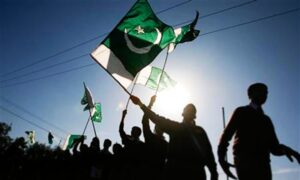Newspaper Article 06/11/2018
The proponents of a weak Pakistan opine that the societal divide on ethnic and sectarian lines, skewed educational system and rampant corruption have reinforced imbalances within the society. While the advocates of a strong resilient Pakistan are confident about the country’s future. William Darlymple in one of his articles titled ‘Pakistan Reborn’ argues: “Pakistan is passing through tough times, with economic and educational problems, inequalities at the societal level… despite these odds, the country is not likely to fall apart.” The Pakistani society over the years has evolved. The industry, roads and communication links, a modern banking system, labour force, a growing middle class and vibrant media offer an optimistic picture. The participation of middle class in the country’s politics is a step towards merit-oriented political culture. On the religious front, the Sufi teachings of peace and tolerance still continue to be a part of the lives of many Pakistanis. The country also has charitable organisations, committed to the welfare of the poor. On the whole, the Pakistani society represents a balanced outlook.
Anatol Lieven, in his book Pakistan: A Hard Country opines that “despite the set-back Pakistan had during the 1971 war, the people of Pakistan did not give up and they continued with their struggle to live and prosper. It is this resilience which has kept the people of Pakistan going.” Lieven asserts that Pakistan is not a failed state and Pakistan is neither Afghanistan, nor Chechnya or Somalia.”
Pakistan has been through hard times, has fought wars; whether it was the Siachen invasion, the Indian nuclear posture or the threatening tone to “run Pakistan dry.” Today, voices are being raised against the China-Pakistan Economic Corridor (CPEC). The project is meant to connect China with the Arabian Sea via Pakistan through Gwadar. Pakistan too would gain because of this investment by China in particular, and other countries which would trade through the Gwadar seaport with the Middle East, Africa and the Central Asian states and Russia. Since it will give financial advantages to China and Pakistan and develop Balochistan, it is being opposed by some political players.
The argument that Pakistan has not been able to combat the militant threat is a tactic employed by hostile elements to justify their extremist acts and wrongdoings. The acts of terrorism committed by Indian security forces in Jammu and Kashmir are a violation of human rights. Prime Minister Imran Khan wrote a letter to his Indian counterpart to resume talks; India initially agreed and a meeting between foreign ministers of the two countries was planned in New York, on the sidelines of the UN General Assembly. Later, India backed out, and terrorism was cited a major concern. In recent firing in Shadimarg area of Pulwama district, a pregnant woman was shot dead by Indian troops. The killing has been condemned by the Joint Resistance Leadership. The leadership has called upon the international community to help Kashmiris in their just cause.
Pakistan as a nation has fought back belligerence, militancy (and has also stood up against natural calamities). But the extremist tendencies at the regional level are the outcome of the conflictual approaches of political players. The war on terror fought in Afghanistan has furthered the differences between India and Pakistan; India doubts Pakistan’s anti-terrorist drive while Pakistan is skeptical of Indian ingress in Afghanistan. In line with the present-day realities, the need is to think from a regional perspective, the regional states need to give up their differences and open up for cooperation. Pakistan’s membership of the Shanghai Cooperation Organisation, Pakistan-Russia relations and CPEC signify the country’s regional positioning. However, to make Pakistani society more tolerant, united and just, the issue of corruption needs to be addressed.
A version of article published in The Express Tribune dated 3 November 2018
[The views expressed in the article are of the author and do not reflect the policy of the Institute]


